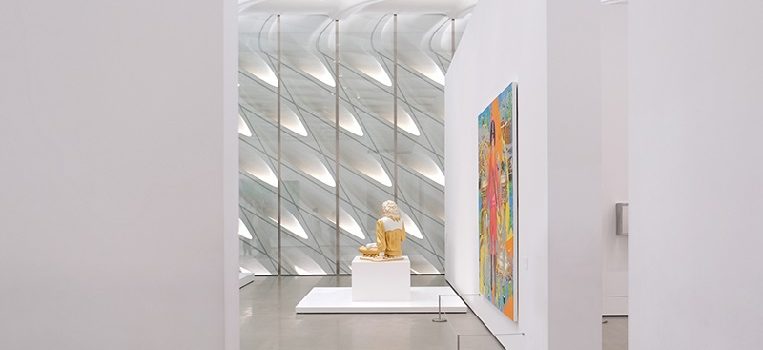Source: Artwork Archive.
You don’t need to be an art historian to build the collection of your dreams. Whether you have questions about who to connect with or how to prepare for your first big purchase, just follow these nine top tips from Artwork Archive, one of the most respectable resources that provides emerging collectors with tools they need to set out on your journey into the art world.
Starting out as an art collector, it can seem like there is insurmountable and uncertain terrain to navigate ahead of you. You see those who have found success, and you wonder, “How can I ever reach that level?” Just remember that all established collectors had to start somewhere. The key is to invest in learning, preparing, and developing your skills and relationships along the way.
Our goal is to make that path a little less obtuse, a little more clear, and to provide you with tools you need to set out on your journey into the art world.
Whether you have questions about who to connect with or how to prepare for your first big purchase, take a look at these nine tips to help emerging art collectors prepare for success:
1. Know Your Tastes
“Most art is bought because the viewer has a visceral reaction to it; it speaks to them, and they want to own it and live with it,” suggests conservator Gordon A. Lewis Jr.
That being said, the first step towards becoming a collector is to get a true sense of what you like. Visit as many museums, art fairs, and galleries as possible. Scour pieces online. Determine which subjects, mediums, and styles of art speak to you so you can begin collecting.
2. Know the Market
This step is crucial. In order to get a fair price and understand what’s valuable in the art world, you are going to have to put in the work to research the art market.
Don’t know where to start? Take a look through all the auction catalogs, gallery websites, and art collecting books you can get your hands on. Ask dealers and other collectors you admire for their wisdom. Learn what different artists and galleries are charging. Travel to art fairs and see what other collectors are buying.
Because an informed purchase is the best purchase.
3. Build Relationships
It’s no secret that in the art world, it pays to be social. Building relationships with curators and galleries can give you access to information on new artists and trends.
Another way to build relationships is by supporting the arts. “Becoming a collector is a process, and one of the best ways to expedite the process is to become a patron at the same time,” says Bettina Korek in her article, Not a Billionaire? You Can Still Be An Art Collector. Donate what you can, says Korek, because the more you can afford to give, the more opportunities there are to interact with curators and other patrons.
4. Set a Budget
Art investment advisors Erica Waldbaum and Jeremy Rhodes believe this point is essential. And, they suggest keeping a few things in mind that can affect the price of an artwork.
For instance, buying directly from an artist is typically less expensive than if the artwork has been previously owned and is being sold through a gallery or auction (secondary market). Also, a high-end gallery may charge more than less-established galleries. Other factors like how rare the piece is, what mediums are used, and what period of the artist’s career the piece was created in can all influence the price.
Don’t forget to factor into your budget costs like insurance, shipping, framing, buyer’s premiums on auction purchases, and special care instructions.
5. Consider an Art Advisor
Art advisors can do great things for your collection while bringing their industry knowledge, relationships, and experience to the table.
If you have been contemplating hiring an art advisor, first you need to understand their fee structure and factor that into your budget. Some advisors work on a retainer, while others take commissions. Some charge an hourly fee, while others may charge different rates for different services.
To learn more, check out What You Need to Know About Hiring an Art Consultant.
6. Get Your Feet Wet
Auctions can be intimidating, to put it lightly. So, before you intend to actually make a bid, Waldbaum suggests attending some art auctions as a trial run to get more comfortable with the climate and process. This way you’ll feel more confident, collected, and ready to bid when you’re ready.
7. Assess Before You Buy
While falling in love with each piece is important, there are a few things you need to check off the list before you take the plunge. First, make an effort to see each potential piece of art in person, especially if you found it online, advises Waldbaum and Rhodes.
Next, dig to find out more about the artist, including his or her reputation and accomplishments. Talk with a dealer you trust to affirm that it’s reasonable price. Take a step back and ask yourself, is this everlasting love or just a fading infatuation? Will it fit in with the rest of the pieces you’ve collected? If it passes these tests, then you’re free to move forward with the buying process.
8. Ask Galleries For a First-Time Discount
“Galleries sometimes discount a piece when they hope to develop a relationship with a first-time buyer” explains Rhodes. So, try asking for a discount on your first piece, and ultimately aim to build strong connections with the galleries you hope to be working with again.
9. Acquire Documentation
Before buying a piece, ensure that you will receive certificates of authenticity and provenance.
Ideal provenance documents the ownership history of a piece all the way back to the artist’s studio. This information is crucial to prove authenticity, increase value, and give collectible significance to the piece through the story it tells.
An easy way to keep these documents safe and secure is to store digital copies and access them anywhere using Artwork Archive’s tools for art collectors.
Building your dream art collection is possible.
You just have to start somewhere. And, the best place for emerging art collectors to start is by developing your tastes, knowledge, and relationships in the art world.
by Artwork








